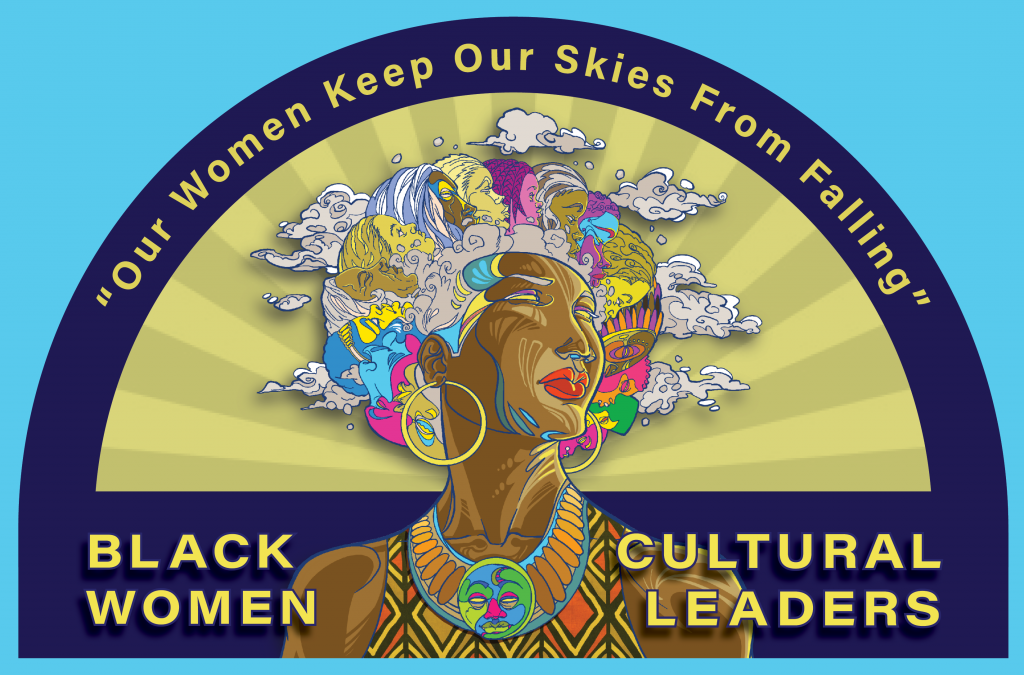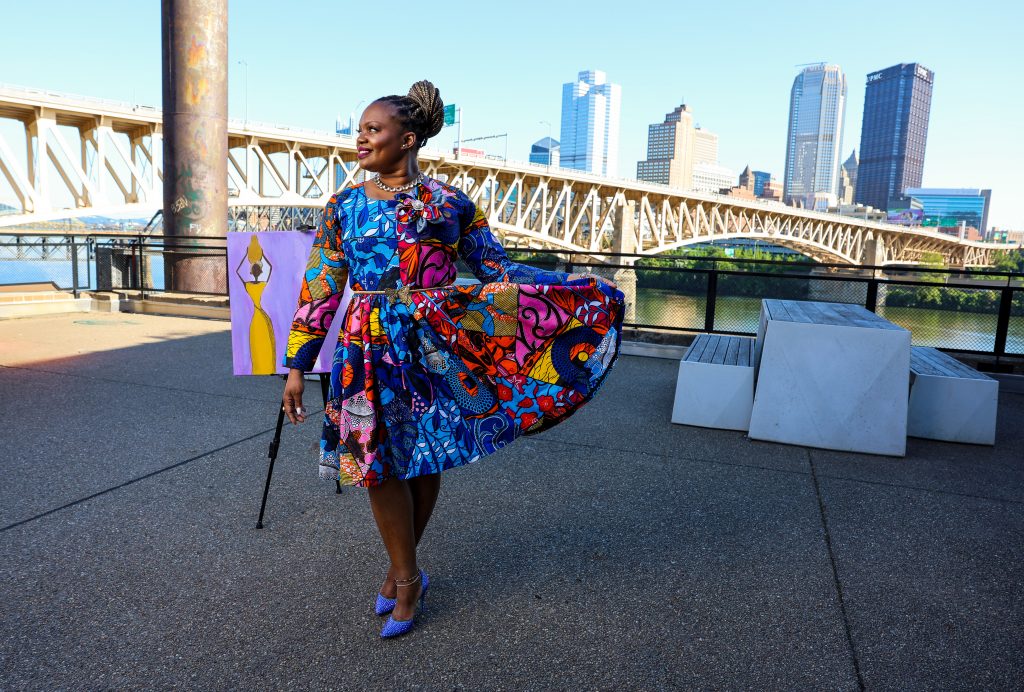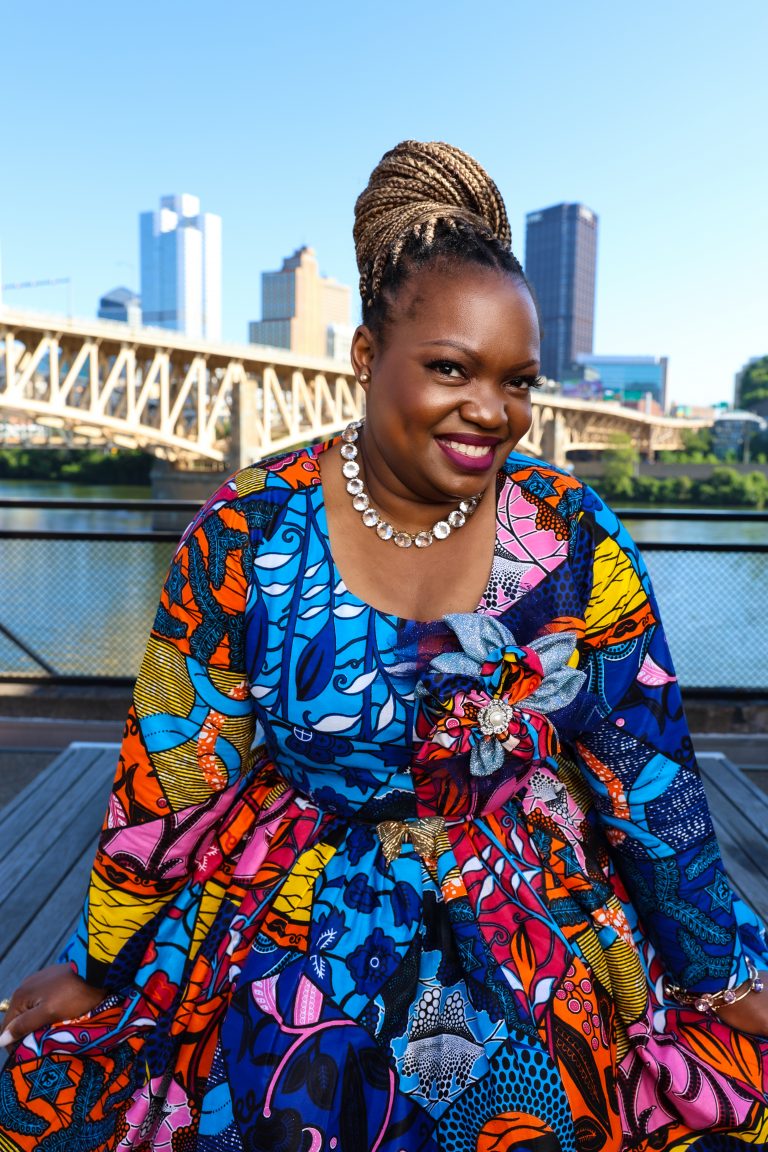The vice president of operations at Afrika Yetu opens up about how world travel and numerous cultural experiences shaped her vision and passion for the arts.
By Ervin Dyer, Madison Stokes and Obianuju Okoye
This story is part of a series on Pittsburgh’s Black Women Cultural Leaders.
Sahara Nzongola is vice president of operations at the Pittsburgh-based Afrika Yetu, an art, culture and educational program that spreads African heritage across the world. Nzongola was born in the Democratic Republic of the Congo and raised in a multicultural environment. She often traveled across continents with her father, a scientist and international banker who earned a master’s degree from Princeton University, and her mother who directed a literacy program in Lomé, Togo.
The family has lived in the United Kingdom, Liberia, Ivory Coast, Togo, Nigeria, and Gabon. Nzongola watched as her mother not only supported her father during these relocations, but also overcame the hardships of relocation by engaging with each community they lived in and by launching grassroots projects there.
Nzongola is the eldest of six children, and she was educated in the private École Française system, which her parents carefully picked to provide smooth transitions throughout their many moves. After graduating from high school, Nzongola moved to Pittsburgh to study Interior Design and Graphic Design at the Art Institute of Pittsburgh.

She established her relationship with Afrika Yetu after graduation in 2005 when she met Elie Kihonia, the founder, president, and CEO of Afrika Yetu; she landed a role in visual communications with the nonprofit.
Afrika Yetu was recently named one of Pittsburgh’s 16 Cultural Treasures and with the support from the Heinz Endowments and the Ford Foundation, the organization plans to continue using its voice and platform to share African music and dance and to build opportunities to learn English, find and create jobs, and secure housing for Africans living in Pittsburgh.
Being at Goree Island (Senegal), and Elmina Castle (Ghana), and watching plays at the University of Lagos about Chinua Achebe’s “Things Fall Apart,” as well as watching Zulu dancers around a fire while at a resort in South Africa, opened my eyes to a different path.
Sahara Nzongola, Vice President of Operations at Afrika Yetu
Nzongola’s experience has helped her rise along with Afrika Yetu, propelling her to the position of Managing Director and today, vice president of operations. She spoke with BlackPittsburgh.com about the organization’s mission and its impact on the Pittsburgh community.
What inspired you to do this work?
My parents instilled in me a very strong appreciation for arts and culture from around the world. I was blessed to visit African countries such as Kenya, Ivory Coast, Senegal, and Ghana, and European countries such as the UK, France, Spain, and Belgium at a very young age. Being at Goree Island (Senegal), and Elmina Castle (Ghana), and watching plays at the University of Lagos about [Nigerian author] Chinua Achebe’s “Things Fall Apart,” as well as watching Zulu dancers around a fire while at a resort in South Africa, opened my eyes to a different path than what was expected from a young girl whose upbringing leaned toward more traditional paths encouraged in my private French schools. What each of these experiences taught me is that each culture is beautiful in its own way and knowing and understanding one’s own culture is primordial to understanding one’s self.
How did you find Pittsburgh when you first came here?
Arriving in Pittsburgh, a very cold, but also very welcoming city, and comparing it to other cities such as metropolitan Washington, D.C. or New York and Chicago, where you have more museums, more African American and African peoples, you feel a little bit isolated. However, I met many people who made me realize how important it was to learn while sharing, such as Dr. Vernell A. Lillie, founder of Pittsburgh’s Kuntu Repertory Theater, and Elie Kihonia, founder of Umoja African Arts and Afrika Yetu Inc. My great uncle, Georges Nzongola-Ntalaja, a professor of African American and African Diaspora Studies, taught lessons on Africa and helped inspire my pride in the cultures of the African Diaspora.

Why is this work important in a city like Pittsburgh?
I have seen first-hand how cultural events and programs bring people together, helping Pittsburgh attract more people, and instill a sense of pride among local youth. Pittsburgh has been named one of the whitest cities in America, and not having a Historically Black College or University here, the African American youth are not exposed to as many dance shows, art shows, poetry slams, stepping performances, or literary events as you would see in Atlanta or D.C. As an African woman moving to Pittsburgh, I can say I felt very isolated at first and very disconnected. Not hearing my favorite style of music, neo soul, played on the radio was disheartening, especially in comparison to the seemingly endless and diverse Black radio stations in other cities like Philly or Atlanta where I got to spend my summers as a teenager.
It’s especially important today because we have disparities in African Studies in primary and secondary schools. The state of Florida is seeing a shakedown in its education system because of the removal of core components of African American history and classics. I am hoping that [Pennsylvania] will not follow this example and continue to provide opportunities for our students to know their history and wear their culture with pride.
In the past year, what aspect of your work are you most proud of?
When I see the next generation creating their own programs – showcasing the culture and how proud they are of who they are – and I witness how the impact has been felt in Pittsburgh, I see a lot of former students or dance group members starting groups of their own and showcasing their own creativity. Young women in my community are opening hair salons of their own, young artists are creating media work. It’s a continuation. It’s exciting to see, especially since a lot of them have fresh new ideas and takes, bringing their own vision and understanding of the world into the mix.
To be young, gifted, and Black, and to continue sharing your gift, that is the most beautiful thing that can happen, as our culture is passed down from generation to generation and shared among family. We are a big family. Even though we don’t always get to sit down together at the fire and tell tales of our ancestors, these dance shows, plays, and drum circles would be a close equivalent.
You’re on your way to your fantasy concert, who are you going to see?
Janet Jackson in concert, with all the dancers from Coming to America/past and present, opening by Zap Mama and backed by the Kassav band as well as HBCU live bands – with The Mahotella Queens and LadySmith Black Mambazo singing all the voices.
What would you like your cultural legacy to be?
I have always wanted to be a bridge, uniting my people separated by the ocean and bringing us together despite and through all the pain that our people have gone through respectively – separately, and together. I want everyone to know that we are siblings who were separated harshly, and it’s important to find each other again, understanding and appreciating each other’s differences and learning from one another.
Ervin Dyer is a writer who focuses his storytelling on Africana life and culture.
Madison Stokes and Obianuju Okoye are with the Pittsburgh Black Media Federation’s Chris Moore Internship program.


